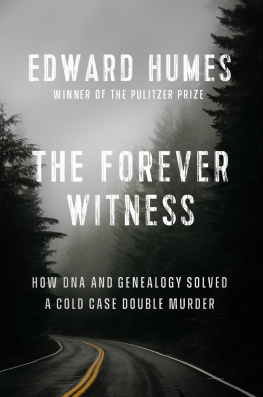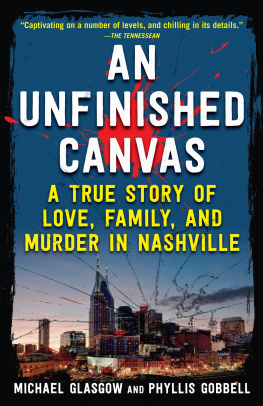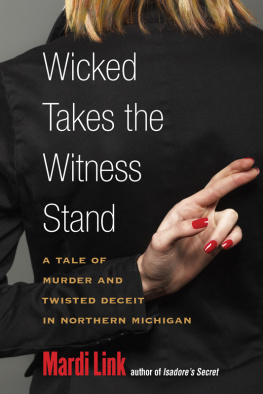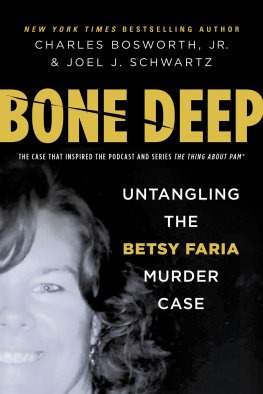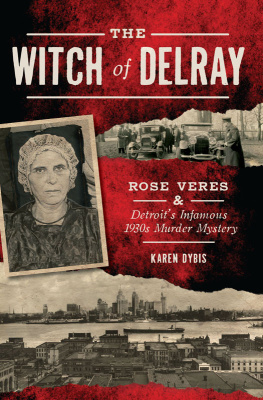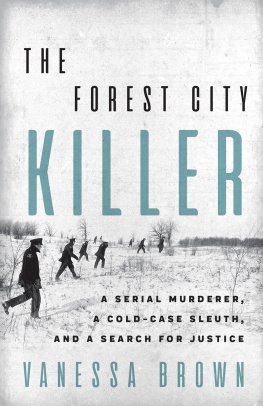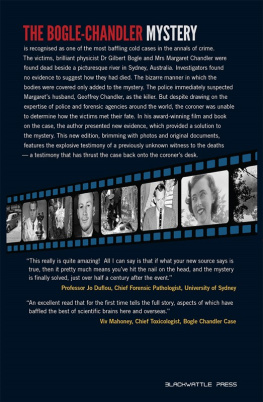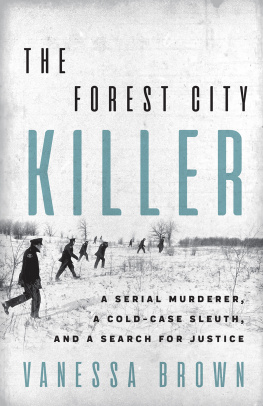N one of thisthe solving of a horrendous, long-unsolved crime or the writing of this bookcould have happened without Bronco Lesneski. His given name is Robert, but most peoplefriends, colleagues, people hes arrested and put awaycall him Bronco.
Hes a triathlete, a longtime member of the Michigan State Police SWAT team, a relentless, passionate advocate for crime victims and their families and, despite a career fighting bad guys, still a gentle soul.
And incredibly helpful.
You never know how cops are going to take to reporters. Even if police are friendly enough at first greeting, you dont know how forthcoming they are going to be with reports, evidence and their all-important knowledge of events.
I was told by one of his superiors that Bronco was an open book who wore his emotions on his sleeves. He was, and is. More important to me, he opened the books, too. Right from the start, before he had official approval from the powers that be in the state police bureaucracy in Lansing, Bronco welcomed me into his small office at the East Tawas post in northeastern Michigan and shared his voluminous files, three thick loose-leaf binders made decipherable by an indexing system that would have done the Library of Congress proud.
Ill never forget buckling up in his car and racing at NASCAR speed across M-55, a major two-lane highway that bisects the northern Michigan woods, to intercept a trooper he needed to talk to. Or, moments later, Bronco asking if I minded if we detoured past his house so he could show me his new golden Lab puppy, whom he picked up and nuzzled and cooed and kissed, unabashedly, a few yards away from a shiny Harley and two big weight machines sharing space in a room in his house.
A SWAT team leader who could get a tear in his eye at the kissing lick of his 9-week-old puppy, he could play it as soft or as tough as was needed.
Once a young cat showed up on his doorstep. Bronco had never had a cat, didnt fancy himself a cat person. But there it was, looking up at him, glassy-eyed, ribs sticking out, flea-bitten. Bronco took it to the vet, told him to fix it up and hed pay the bill, figure out later who to give it to. While sitting in the lobby reading a cat magazine, he read an article on the need to neuter your pets. So he told the vet to take care of that, too.
He got a friend to adopt the cat, but it didnt work out. The friends old cat didnt get along with the new cat, so Bronco took it back. Now, hes a cat person, too.
Tough guy and a kid at heart.
The disappearance of two deer hunters from the Detroit area in the woods of northern Michigan in 1985 had a particular resonance in the state. Up north is where folks generally flee from the metropolitan Detroit areaon weekends in the summer to rent a motel room on a lake, or, if theyre lucky, to stay in the family cottage; in winter for the downhill and cross-country skiing and snowmobiling; and, by the hundreds of thousands the last two weeks of November, for the annual deer hunt.
Detroit is the place you flee from, with its congested highways or fear of crime or just the job you barely tolerate. Up north, as everyone calls it, is the sanctuary, where the worst thing that can happen to you is kids breaking into your cabin in the off-season, looking for booze or stealing a TV.
So when David Tyll and Brian Ognjan, two friends since childhood, left their families to go hunting a week into deer season in 1985 and were never seen or heard of again, it wasnt just another possible crime. It was special. It was scary.
Theres a reason fairy tales and slasher movies often take place in the woods. Woods are primeval, even modern ones with their neatly planted rows of red pines. Even the ones we go to to get away from it all. They may be our sanctuary, but on some instinctual level, theyre still the woods. The missing hunters reminded us of that. If we thought the woods were a haven, if we thought we could escape there, well, we were wrong.
The hunters went missing, and weeks that became months that became years of investigation and relentless searching yielded little more than newspaper headlines.
Were they fed up with the ennui of family routine and their jobs as a mechanic and a machinist? There was some evidence they had been. Had the two just decided to take up new lives somewhere?
Had they run afoul of the wrong people at the wrong time in the wrong place? There was evidence of that, too.
Only a few things were certain. They disappeared. Their Ford Bronco disappeared. Families were left shattered.
A series of state police investigators worked this case harder than youd ever imagine. Worked it when it was fresh, of course, but kept working it as the years went by. Would drop it for a while when leads ran out or other cases demanded attention, then pick it back up. Worked it well after it would have been reasonable to declare it hopeless and stuff the files in a box in a closet.
When Bronco inherited the case, he also inherited an enormous work load and a beat that covered roughly 2,500 square miles, four sparsely populated counties filled with dense woods, swamps, rivers, creeks and lakes, and crossroads towns and villages. He also inherited two cardboard boxes filled with reports that, quite frankly, no one would have blamed him for sticking back in the closet.
There was no time and nearly no budget for working the old case, but it was there if he felt like it.
He felt like it. He made the time.
By the time he was done, he and his co-workers had looked into hundreds of tipscredible or notfrom thirty Michigan counties, ten states and several provinces in Canada. They had matched the dental records of Tyll and Ognjan against all unidentified bodies in the U.S. in an eighteen-year period. State police dive teams had been in ponds, lakes, streams and several branches of the AuSable River. Aerial searches had been done in Newaygo, Ogemaw, Iosco, Oscoda, Alcona and Roscommon counties. There had been at least five searches by cadaver teams over the years in four counties. Interpol had looked for David Tylls car around the world.
This is a story about the relentless search for justice. Bronco and his cohorts made Inspector Javert look like a slackard just biding his time till retirement.
I f you followed Bronco Lesneski around in his off-duty hours and didnt know who he was that winter of 1998, you might have thought he was a Jehovahs Witness or maybe someone running for the school board. Dressed in a sport coat and tie, getting out of his car again and again to knock on the door of a house, introduce himself and ask if he could come in.
Leaving moments later. If you were good at reading faces, you might have seen just a hint that hed gone in there hoping to accomplish something and hadnt. Back in the car, off to the next house down the road in the sparsely populated woods of northern Michigan, outside the small town of Mio, the only town in thousands of square miles big enough to have a stoplight.
Hed put in an hour or two knocking on doors, call it a night, head home to his wife.
And, schedule permitting, in a day or two, hed be back out knocking on doors, introducing himself some more.
One morning, breaking up the routine, feeling like banging on doors in the daylight for a change, before he went into the office to work on his active cases, he pulled into another driveway, walked up to the door and knocked.
A woman opened the door and peered out. He introducedhimself, told her what it was about. Are you Barb Klimmek?



